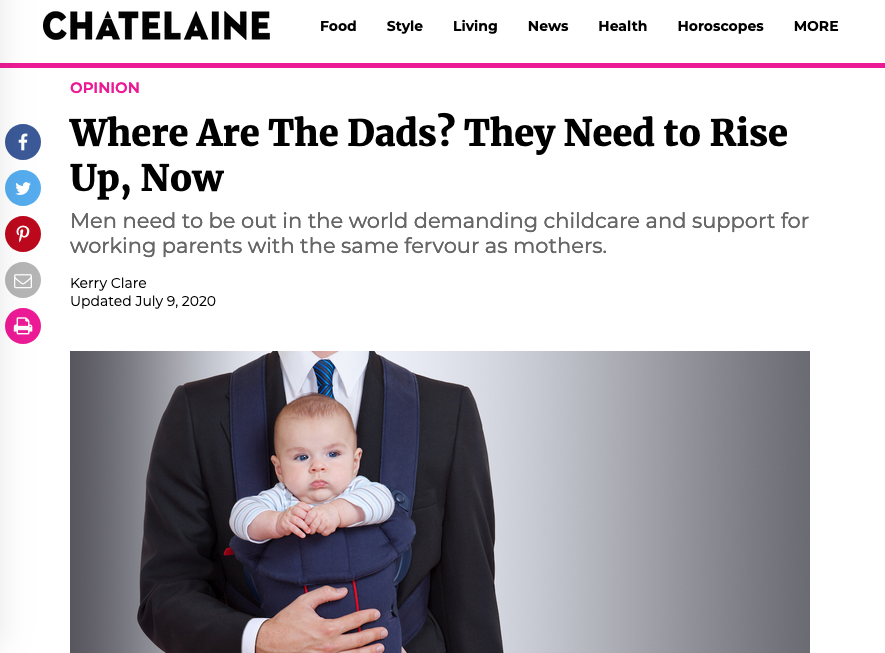July 21, 2020
Gleanings
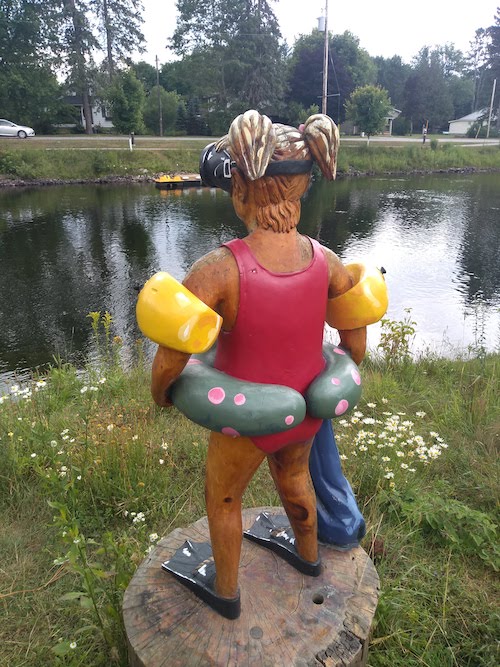
- Acknowledging the fact that adults and kids feel with the same passion and intensity, even if they read on different levels, is central to both the composition and reception of Lobel’s books.
- Why can’t everyone be perfect, like me? The world would be a much easier place to navigate, right? Maybe there’s a reason I stayed single for 48 years.
- if you seek out pockets of happiness, you’ll be better able to weather the other registers, the inevitable truths of the less pleasant and trickier spheres.
- One Camera One Lens One Year Starts Now
- I am here because someone a long time ago said I could be and made it that way.
- They weren’t “escapist,” exactly. But they were horizon-broadening, in the best possible way.
- What I have loved the most, are all the trees that surround us.
- I love blogs. Always have. Always will. I love that they are a little capsule away from the business of social media and that you can dive in and find out lots more about the blogger in a very focused way.
- It did take a long time but last night it was as though nothing bad had every happened.
- It is safe to say that my interest in family history research was borne of boredom.
- It seems radical to wonder if we could despise less and love more, right now.
- I felt I was writing my way through the pandemic, yes, and part of what I was learning was patience.
- This morning I went to my place of worship.
- I love to begin mornings with something beautiful.
- For me, there is always both/and when I think about rabbits on the beach.
Do you like reading good things online and want to make sure you don’t miss a “Gleanings” post? Then sign up to receive “Gleanings” delivered to your inbox each week(ish). And if you’ve read something excellent that you think we ought to check out, share the link in a comment below.
July 20, 2020
Pandemic Vacation
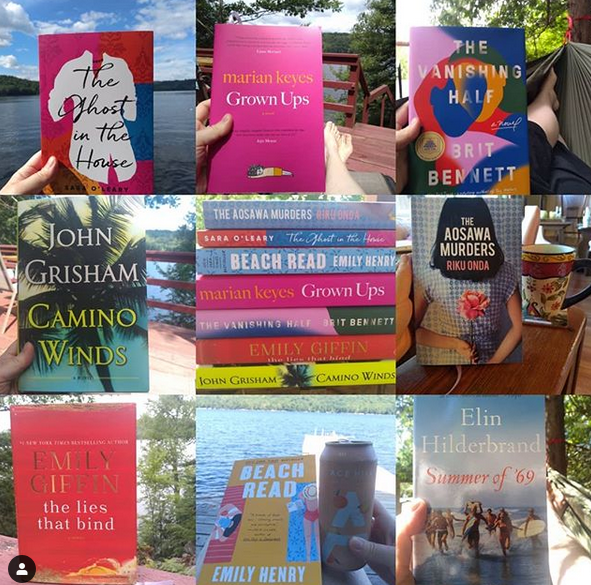
A thing I never knew until 2020 is that there is no vacation like a pandemic vacation—but what a wonderful lesson to learn. If one must live through a pandemic, I mean. Our original summer holiday was cancelled at the end of May, but summer rentals had reopened in Ontario at the same time after being closed since March, which meant there was still some availability and we wasted no time in booking. We weren’t sure what we’d find when we got to the random cottage we’d booked on the internet, or if this holiday would feel second-tier, as sad as 2020 in general. Plus what of spending time together as a family after having been holed up for months… But it was everything, beautiful with amazing swimming (I hadn’t swam for 120 days!), cut off from the world so we could forget about everything except the sky and the trees, and the way the lake was always changing. I read a book every day, relished escape from the city heat, had fun with my family, and delighted in these days of being at peace. Checking out the newspaper midweek too to learn that not much had even happened while we were gone. It was a very good week, and I’ve never been more grateful for a holiday.
July 10, 2020
The Hollow Land, by Jane Gardam

Last weekend, I had no idea what to read next, which never happens, because I always have this book or that to read for review, or whatnot. I have a pile of new releases that I am definitely excited about, but these were being saved for my holiday. So what? I picked a few books off my shelf and started them, but none of them took, and then I started reading The Hollow Land, by Jane Gardam, a book that’s been sitting on my TBR stack for a while, which I wasn’t even that excited about because sometimes Jane Gardam is hard work (kind of abstract; wholly worth the effort, but can be daunting; maybe it’s just me?).
The Hollow Land was winner of the Whitbread Book Award when first published in 1982, though the fact that it was a collection of linked stories about two young boys didn’t really grab me in theory. I started reading, however, and was hooked—finding the perfect read when you’ve been floundering is a little bit like that sweet relief of being well after an illness. “This book!” I kept exclaiming. So funny, so biting, so delightful. About a rural family in Cumbria whose grandfather’s farmhouse is let to a family from London who come for vacations, leading to all kinds of cultural intersections and misunderstandings. (It is not entirely unlike Schitt’s Creek, to be honest, especially in that polite fun is poked at everybody, and everybody gets to be human.)
Indeed, a collection of linked stories, but more effective than just a gimmick, and they come together to make the book more than the sum of its parts. We return to Bell and Harry as they grow older, as Harry and his family become familiar with the community, and we meet its eccentric characters. It’s pitch perfect, clever and fun, deft and subtle characterization. Kind of like Stephen Leacock’s Sunshine Sketches if they were 300% times better…
And then in the last story, the whole book shifts into a dystopia, taking place in a 1999 after the end of oil…but not so much as changed for Bell and Harry in Cumbria—they’ve gone back to plowing the fields with horses, that’s all. An interesting thing too to consider the end of oil in a land whose hollowness comes from the fact it was long ago mined for coal. A dystopian future set in a rural idyll where nothing ever changes, where timelessness is its essence. It’s such a strange and unexpected diversion, but makes perfect sense at the same time.
Just as reading the book did for me.
July 7, 2020
Gleanings
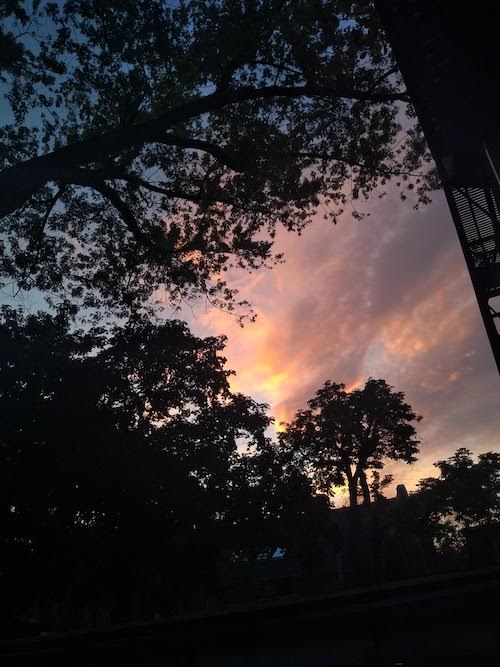
- One of the goals I set for my epic 2020 to-do list? Make more preserves and pickles than last year!
- I think if we really go deep and allow ourselves to answer those questions, the world would be a better place.
- All I know is that I feel beleaguered – by these strange and difficult times, and by people who are making it worse.
- Despite outside influences, my attitude toward dandelions sashayed as if in a dance.
- There is the constant ongoing slightly absurd persistent splendid fact that you are required to make something beautiful.
- She’s good– very good, even! It’s just that she’s always good in exactly the same way, sometimes even in the exact same words.
- You’re walking and your eye yanks at your brain and says, Hey look, look again, look closer.
- Swimming, the swallows light on the surface of the lake, I want to tell that young woman to linger in the garden, linger among the vines and leaves.
Do you like reading good things online and want to make sure you don’t miss a “Gleanings” post? Then sign up to receive “Gleanings” delivered to your inbox each week(ish). And if you’ve read something excellent that you think we ought to check out, share the link in a comment below.
July 6, 2020
Not for Me
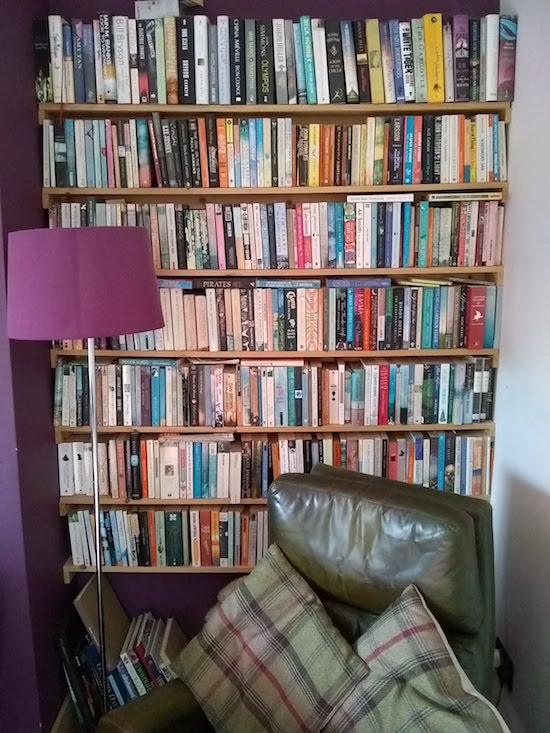
In the 21st century, it almost seems radical to dislike something in non-declarative terms. Not even with a “meh,” which is more disdainful than it seems, but instead something more along the lines of, “I tried this, and it’s not for me.”
My new thing is easing out of having strong negative opinions, unless the strong negative opinion is super interesting and worth delving into. But more often than that ever being the case, strong negative opinions seem to me to be a fancy way to dress up the fact that one simply doesn’t like a certain thing. Or maybe what I’m saying is that you needn’t necessarily develop an elaborate theory as to why a piece of art is not to your taste.
(I’m still figuring this out. It’s an ongoing process.)
I’m thinking about this because Ottessa Mosfeigh has a new novel out, and people are excited, and whenever people are excited about a novel, I want to be excited about it too. But I think I just don’t like the work of Ottessa Mosfeigh. I read Eileen and it was interesting enough, but when I finished it, I kind of thought I’d read all the Mosfeigh I wanted to read for this life. And then last summer, friends were reading My Year of Rest and Relaxation, and loving it, so I decided to give it a chance—but it was the kind of book I rejoiced at finally finishing at the fact of its being over. Even as I recognize, I do, what other readers find remarkable about it, even appealing, but it doesn’t work on me, I think. I am insusceptible to Mosfeigh’s spells.
I also (forgive me please) didn’t see the point of Jenny Offill’s Department of Speculation. It didn’t work for me. I don’t understand the appeal of “art monsterdom” anyway (could a distaste for monstrousness be at the root of my feelings about these books, I wonder?). I own a copy and at least it’s short, so I’ve been able to read it more than once, to try to figure out what everyone else was seeing in it—and I’m not quite ready to abandon Offill yet, but I don’t want to shell out cash for her latest novel either (it’s hardcover!) so am on the library holds list, where I’ll probably be waiting for hundreds of years.
Now, of course, there are plenty of books I do think are terrible, and if we ever meet up for a drink, I’ll probably tell you all about them, but I’m thinking about something different here, things that are good that I still don’t like, and how that’s okay, both for me and the people who like them.
July 3, 2020
The Moment of Tenderness, by Madeleine L’Engle
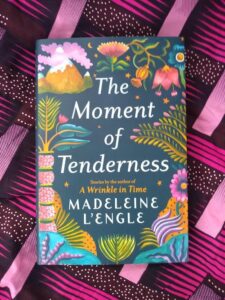
It’s a gamble, a collection of previously unpublished short stories discovered after an author’s death, particularly if, as with The Moment of Tenderness, by Madeleine L’Engle, most of these works were written during her wilderness years, after she’d achieved only modest commercial success with her novels and hadn’t yet published A Wrinkle in Time. Even worse, I read her first novel The Small Rain last year, and I thought it was pretty awful.
So what was I getting into with this new book, in hardcover no less, bewitched by the gorgeous cover design, and its prominent display in a local bookshop window?
Mercifully, it all turned out fine. And that nearly all these stories are worlds away from A Wrinkle in Time actually suits me, as I’m much more a fan of L’Engle’s realism anyway. Many of these stories autobiographical and laid out as a coming-of-age, with child protagonists at the beginning, growing older as the stories progress. Many of these feature a character called Madeleine, even married to a man called Hugh Franklin, as L’Engle was, though Madeleine L’Engle’s husband was on All My Children, and the Hugh Franklin in the book runs a general store. (And as always, it is this way that L’Engle blurs fiction and reality that I find as fascinating as any questions posed by sci-fi or fantasy.)
The middle stories were my favourite, New England fiction that channelled Shirley Jackson, who was L’Engle’s near contemporary. One of the stories even features witches. Others recall the works of John Cheever, stories of suburban dissatisfaction. And there’s even a turn to the Southern Gothic–L’Engle had a transient childhood, but roots in the south.
I loved reading this book, though I am not sure it’s necessarily going to appeal to anybody who ever had a thing for Meg Murry. For L’Engle completists however, and also short story fans, there is so much to delight in.
July 2, 2020
Things I Like
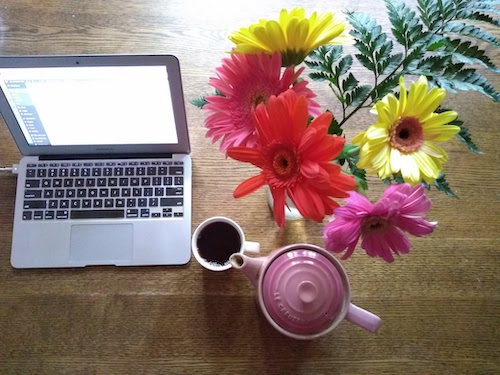
I am sorry I’ve been out of touch. Except for social media updates, of course. And we’ve been getting together with friends in our neighbourhood, picnics in the park, but the idea of anything further afield kind of overwhelms me. By April, I was done with Zoom. And my world is so small right now, wedded to routine, that any deviation throws me for a loop. I’ve always been a bit like this, but living in pandemic times is even more so—and as real life begins to return again, it’s something I’m going to have to work on, at least if I want to continue to have friends, which I do.
But in the meantime, I read on the couch every night—which is kind of my ideal situation, to be honest. And I’ve tried to balance going to nobody’s online literary event by buying and reading all the books instead—even in the before-times, I’ve always preferred partying alone with my book to going to a book party anyway.
And when I’m not reading, there are a few other things that I’m getting up to, things that help me measure out my days and bring me joy, which is why I want to share them with you.
Jen Knoch’s Tuesday newsletter is fabulous reading, rich and thoughtful with smart ideas about our environmental impact. I look forward to it every week and you should sign up too!
I’m not a metal fan (you are SHOCKED, I know), but “Wind of Change”, by Scorpions has long been a fascination of mine, along with Cold War history, so I was intrigued by this podcast exploring rumours about whether the song had been a project of the CIA—and it’s by Patrick Radden-Keefe whose book about the IRA Say Nothing was a favourite in our household this year. The podcast is fun, but really interestingly explores ideas about propaganda as it progresses (is the podcast itself propaganda, Radden-Keefe wonders?).
We call this “The Trashy Podcast” at our house, but it’s also smart and interesting—the episode with Congresswoman Katie Porter was unforgettable. To be honest, co-host Rick Wilson is not my fave, a former Republican strategist whose work is responsible for the mess we’re in—he refuses to see a possibility of politics not having to be a dirty game, but he likes himself enough that my feelings are never going to matter—but Molly Jong-Fast is great, and it’s the kind of perspective on American politics I appreciate right now, one that refuses to take the Ding Dong President seriously.
There are some stand-out moments in the blur of these times, and the weekend of The Big Lasagne at the end of April was one of them. (It was actually too hot to be cooking lasagne that weekend, and I was reading Writers and Lovers, by Lily King. It was lovely.) Samin Nosrat, of Salt, Fat, Acid, Heat fame, decided that people the world over could cook lasagne together, and so we joined her, making SmittenKitchen’s recipe that involved two days of prep and fresh pasta. It was amazing and our lasagne even got reposted on the New York Times Cooking Instagram feed, which might be as close as I ever come to being in that paper.
Things delivered to my door have also been a real delight—books, donuts, popsicles, and more!—but Spade and Spoon is my absolute favourite. We were almost out of maple syrup one day in April when they first came to our service, and we bought jam too, lots of jam, and pickles. Every two weeks they’ve been delivering their products to the GTA, and we’ve ordered quite a few times. Nothing tops the pickled asparagus though. So so delicious.
When I read Madeleine L’Engle’s Austin series last year (which I haven’t mentioned for at least five minutes!) I felt very sensible for having borrowed each book from the library, but there came a moment in April where not having these books in hand was no longer acceptable, so I ordered them all, speaking of deliveries. The best thing? They’re kids’ books so five of them is not much more expensive than a regular hardcover. (In my mind, this basically constitutes making money…which is one of many reasons why I am not rich.) And then I started to read them with my family, and everybody’s enjoying them—we’re halfway through The Moon By Night. I can’t WAIT to read The Young Unicorns with them! Previously, I’d thought perhaps these books with their ominous undertones was too dark for family read-alouds (as Vicky Austin contemplates the genocide of Indigenous peoples and fears nuclear holocaust) but it doesn’t feel like that anymore.
I miss swimming. It’s been over a hundred days since my last morning swim and my towel and bathing are still hanging over the banister where I hung them, but I am filling the void with morning yoga classes online with the YMCA of Greater Toronto, which similarly let me start my day with my body feeling good. Our favourite teacher is Nazia White, and we love her. The YMCA is moving to a summer schedule next week so there might be less yoga in the offering, but we might double up on the classes, because a daily dose is a very good thing.
July 1, 2020
Leftover Spaghetti Frittata (or We’ve Come a Long Way)
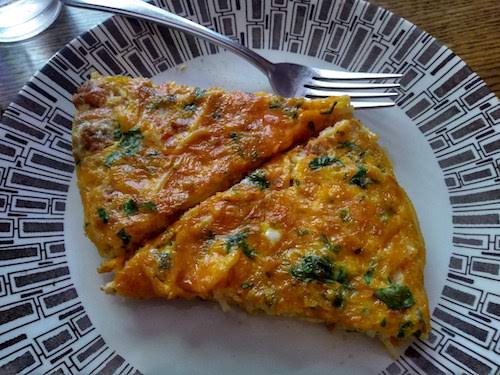
I made leftover spaghetti frittata for the first time at the end of March. This was when I kept scrolling news in hopes of good news, and there was none. I kept checking in on food writer @emikodavies under lockdown in Italy, and it was some solace to see her family’s daily life continuing, albeit in confinement. If they could keep going, so could I, was my reasoning. The recipe she posted in her feed also appealed to me for its frugalness. This was in my “reusing parchment paper” phase, when I was worried about food availability. It made a meal that was as comforting as it was delicious.
I do not think the pandemic is over. And I WOULD go into detail about our rituals, the ways we’re taking precautions, but I won’t, because reading such posts from other people makes me anxious. Suffice it to say, however, that we have not returned to business as usual. But we have also found ways, in this new reality, to reclaim joy and pleasure, and it’s not at all as incongruous as a lot of people might think.
I do not think the pandemic is over, but I really want to celebrate how far we’ve come since that dismal day in late March when I first poured eggs into my spaghetti. I think a fixation on US politics here in Canada has confused many people about the many ways their situation is different from our own. And there are, of course, a hundred other reasons to be lugubrious right now…but we’re still here, and now it’s summer, basil blooming in my garden, which I mixed into our frittata today.
There have been unfathomable losses, it’s true, but things are better now, infection rates here in Ontario continue to be low, community spread decreasingly a factor. The pandemic is not over, but do you not see still what a wonderful thing this is? That we are not without reasons to be hopeful after all?
I am going to make spaghetti frittata forever, I think. I am going to use spaghetti even as a means to frittata, in fact, and it’s going to remind me of these days, of all we’ve learned about community and connection, living with uncertainty and weathering hard times. Of what grows, and persists, and even blooms.
The pandemic is not over, but we have come such a long way.
June 30, 2020
Gleanings
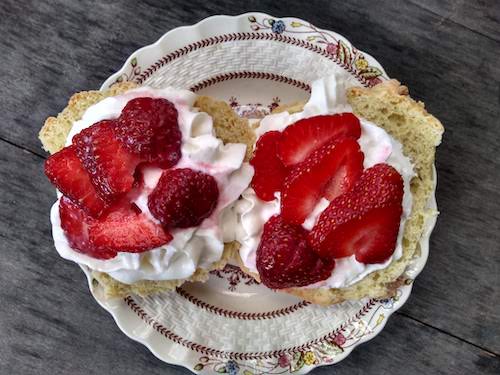
- We white people, who have the privilege of not being treated badly for our skin color, are being called to create new stories for everyone.
- The work I’m doing is my business and I have to think hard—constantly — about how to effect change and uphold my values
- Strawberries pretty much steal the show…
- “Oh my god,” I thought to myself in shock, “what am I doing? I don’t even know this guy and in just a few hours I’m going to marry him!”
- But watching these clouds parade across the sky, was a ritual which brought into my body, through my eyes, a sense of possibility as endless as that blue sky….
- So anyway, that’s me and masks and I’m just going to have to embrace it like everyone else.
- Writing is not the only work.
- I am never quick to clear plates, because I find this stage of a meal thoroughly satisfying.
- Six nags and mottos to embroider, when I master the satin stitch.
- Cruel systems surround us. Unless we’re cut by them, we can stay blissfully unaware.
- There is a specific kind of rain that warms my cockles. It’s the steady, light as the wing of a hummingbird, and flows in a gentle, easy way.
- You never knew, eavesdropping on Mildred’s stories, what you might hear, but it was guaranteed to be good.
- If, during these sheltering at home times, you’re lucky enough to have a garden, I’ll bet you’re embracing it.
- Swimming this morning, I wondered, where does the word “lake” come from?
- The chamomile is posing against the black currants that I’m looking forward to.
- I really admire Vivian Maier’s photographs, in particular her black and white self-portraits.
- The thing about posting photos of yourself through time, is that you really begin seeing yourself, and seeing yourself differently.
A handful of posts here are from writers who took part in my June blogging experience. They have been amazing. My next course offering is coming in September, and registration is open now.
